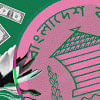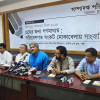The concept of a public institution eludes our central bank

In the mid-1980s, military dictator HM Ershad banned BBC's journalistic operations in Bangladesh. In March 2022, the Taliban banned BBC's local language services in Afghanistan. It can thus be theorised that authoritarian rulers simply hate any journalistic investigations because the press is detrimental to their longevity. But for journalists' normal, professional access into a financial institution in Bangladesh to be barred is an untimely absurdity. It raises a question as to whether something is really wrong within Bangladesh Bank (BB) right now, given that the regulator is floundering in the theatrics of mergers and trying to convert rotten apples to fresh oranges by covering up multiple loopholes.
BB has recently restricted the journalists' access for no reason in sight. Of course, BB's policy restlessness in recent months surrounding default loans, the dollar's exchange rates, reserves, remittance, inflation, and mergers have drawn in more criticism than praise from the media. Meanwhile, journalists have been reporting BB's half-baked ideas and erratic steps. They are only doing their job, as they have been for so long. It is their noble duty to report any public or private sector wrongdoings so as to alert the nation. So what's the problem?
The BB governor has attempted to explain the decision as trying to protect some "top secrets" of the central bank. If the so-called top secrets aren't religiously private, he is supposed to share these with the public via the media. People have every right to know such information since the central bank is the regulator of banks which live and thrive on people's money. And the BB is not like police headquarters; it doesn't handle murder cases which may warrant confidentiality. The culprits BB might be dealing with are wilful defaulters who are at the root of plundering the financial sector and thus placing the economy on the cliff's edge. But even these cases shouldn't be kept secret. The BB governor is a custodian of the state's interests, not those of loan defaulters. Being a hundred percent transparent is the first point of his oath.
The culture of central banks addressing journalists has been there since the early 1990s. Economist Alan Blinder, the then vice-chair of the Federal Reserve System, championed the culture of making central banks more accessible for and accountable to the public. His campaign, "Fed listens," has been a paragon of how a central bank must ensure free flow of information. The journalists help establish communication between policymakers and the public. The current Fed chair Jeromee Powell regularly meets with journalists after every policy decision; so does the governor of the Bank of England, Andrew Bailey. The current president of the European Central Bank (ECB), Christine Lagarde, previously the chair and managing director of the International Monetary Fund (IMF), invites the press for question-and-answer sessions quite regularly. The ECB also welcomes public tours to improve the common understanding of how central banks work and what purposes they serve.
The IMF outlines four principles of communication by central banks. It asserts that communication should be clear, candid, and transparent. Second, communication should reach all segments of the population. Third, communication should take place regularly. Fourth, all economic agents should have equal access to the same information. Ben Bernanke, who chaired the Fed and won the economics Nobel Prize, made it clear that central bank governors are public servants, and it is their responsibility to provide the public with as much explanation of their decisions as possible. Former Reserve Bank of India governor Raghuram Rajan faced journalists quite confidently because he understood economics well and didn't fear being dethroned by any tycoon groups. None of those mentioned above resorted to using their spokesmen to justify their stances because the respective governments appointed them knowing that these leaders know how the economy functions and thus can speak for themselves. At any central bank, every information is public information, and hiding anything is equivalent to doing a disservice to the government.
The economy is facing high inflation and reserve depletion. The banking sector in particular is in its most appalling state, requiring constant checkups like a patient in the ICU. In such a situation, journalists are akin to those devices surrounding the patient which work tirelessly to report BB's financial symptoms to the public.
BB needs extensive interactions with journalists more than ever before, because journalists can read the public pulse and communicate with stakeholders efficiently. No other service can replicate the functions which the media carries out for the public. Journalists mustn't be seen as counterparties, nor are they enemies of state interests. BB should rather engage with journalists as well-wishers and counsellors in regards to policy steps. Had BB adopted this practice in early 2022 when the prevailing crises began to surface, the governor would have been regarded as a good policymaker by now. But BB's attitude towards journalists has recently been more bureaucratic than accommodative, and that is doing more harm than good.
Restricting journalists in the secretariat should in no way be a good example that is blindly replicated in an institution like BB or the Bangladesh Securities and Exchange Commission. These bodies deal with citizens' savings and investments and citizens have the right to inquire about what the custodians of their assets are doing with them at any point in time. Thus, preventing journalists from discharging their duties is unconstitutional and demeans the noble objectives of the Bangladesh Bank Order, 1972 which was framed under Bangabandhu's guidance after independence. BB must revise its approach to journalism by following global best practices and thus improving its knowledge base.
Dr Birupaksha Paul is a professor of economics at the State University of New York at Cortland in the US.
Views expressed in this article are the author's own.
Follow The Daily Star Opinion on Facebook for the latest opinions, commentaries and analyses by experts and professionals. To contribute your article or letter to The Daily Star Opinion, see our guidelines for submission.

 For all latest news, follow The Daily Star's Google News channel.
For all latest news, follow The Daily Star's Google News channel. 










Comments